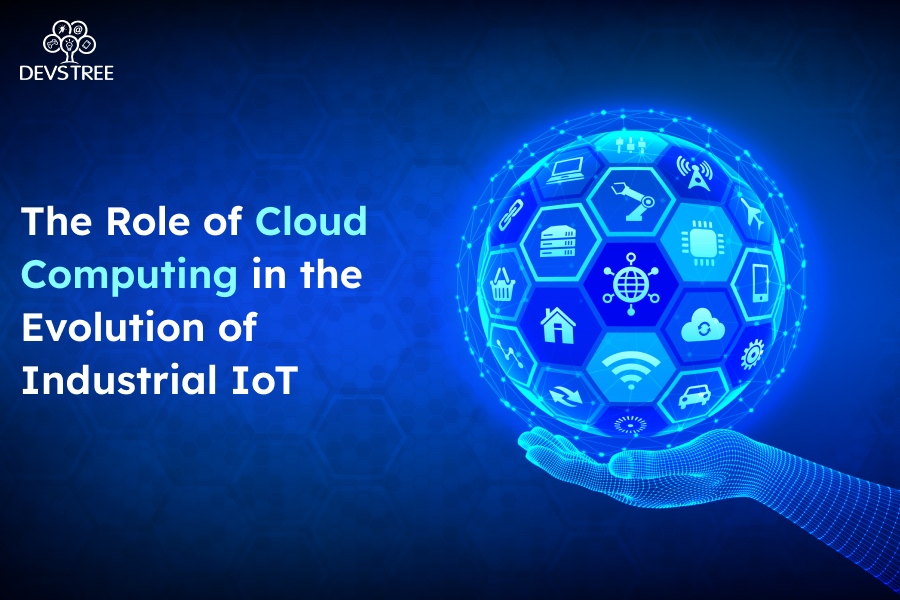- December 13, 2023
- by devstree
- Technology
- 470 Views
- 1 Comment
Technology is changing at a rapid pace day by day. The world is having new technology updates with each passing minute. For growth and invention, it’s necessary to put different technologies together. The Internet of Things( IoT) and cloud computing are two technologies to produce wonder when used together.
Data created by IoT systems is needed to be safely stored and handled. Cloud computing provides a framework for IoT data storage, processing, and management. Utmost devices use cloud computing technology to store and assay data.
The blog will help you look at how cloud computing is impacting the growth of the Internet of Things( IIoT).
Cloud Computing and Industrial IoT Overview
The Meaning of Cloud Computing:
Cloud computing is the Internet-based supply of computing services such as storage, processing power, and software applications. Rather than counting on individual PCs or on-demand servers, cloud computing enables enterprises to enter and use these resources as demanded, paying only for what they necessitate.
Understanding the Industrial Internet of Things( IIoT)
The Industrial Internet of Things( IoT) is the collection and exchange of data through the integration of physical devices, sensors, and software systems in artificial settings. It allows for the robotization, monitoring, and control of many processes, amending functional effectiveness and allowing for data-driven decision-making in industries similar to manufacturing, energy, and transportation.
Reasons Why is Cloud Computing Important for the Growth of IoT?
Remote Access:
Cloud computing enables the management and execution of devices and data from a remote location. In increasing nations, 5G connectivity is diminishing the requirement for on-premises servers. You can scale up or down as needed with cloud-based systems, and edge computing makes it easy to deliver data to the core cloud. Edge locations are being combined into cloud services to improve performance and lower costs.
Data Exchange:
The exchange of data from smart devices between parties is essential for the success of IoT. IoT Cloud Integrations can be used to safely and properly share data. For example, a smartwatch can share data with medical specialists, resulting in better healthcare solutions for everyone.
Secure systems:
Cloud-based systems are frequently more secure than on-premises systems. Cloud computing works smoothly with the top authorization and authentication service providers, allowing data to be stored on remote servers. Businesses may safeguard sensitive data both in transit and at rest by implementing encryption.The Internet of Things enables connected items to communicate, offering previously unimaginable cloud computing services. Cloud platforms are utilized to remotely manage and execute IoT devices. Self-driving automobiles can be linked to traffic lights and controlled remotely to alleviate congestion and increase road safety.
Robust:
In an era where device connectivity is important, cloud computing provides a reliable platform for business. IoT applications can be deployed over many regions to offer redundancy, and data can be copied across various regions. If there are any problems with devices or data, they may be rectified quickly and easily without having to rebuild the system from the ground up.
The Role of Cloud Computing in Industrial IoT in the Future
Cloud Computing Emerging Trends and Innovations for Industrial IoT:
Cloud computing‘s future in the artificial IoT landscape is promising, with rising trends and inventions pushing the boundaries of what businesses can do. Edge computing, for example, is gaining vogue because it enables fast processing at the device situation, reduces cold storage, and improves real-time decision-making capabilities.
Cloud-based industrial IoT is also being converted by artificial intelligence( AI) and machine learning (ML). AI and ML-powered advanced analytics algorithms provide predictive maintenance, anomaly detection, and process optimization in industrial operations. The convergence of cloud computing, AI, and machine learning (ML) is opening up new opportunities for improved efficiency, productivity, and sustainability in the industrial sector.
Predicting the Growth and Potential of Cloud-Based Industrial IoT:
With an ever-boosting number of connected devices and the exponential rise of data created by artificial IoT systems, cloud computing will continue to play an important part in enabling businesses to completely use this technology.
Internet of Things development services are an excellent choice for managing and assaying large data, maintaining the responsibility and accessibility of industrial IoT structures, and resolving security concerns due to their scalability, inflexibility, and security. The future of cloud-based industrial IoT contains enormous growth and potential for organizations across multiple industries as cloud computing evolves and new technologies emerge.
Final words:
Combining cloud computing and IoT provides several possibilities for businesses to boost productivity, effectiveness, and growth, making it a fruitful profitable instrument. However, please contact us right away, If you’re looking for Internet of Things development services.
